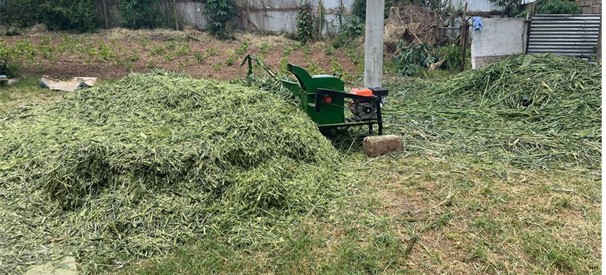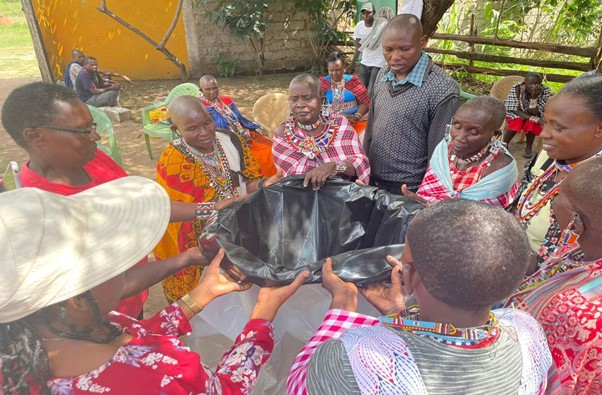A Story of Resilience
18-03-2024
Combating drought and building resilience in dairy production through fodder production and conservation
Supported by Agriterra's Acting Now Project in Kajiado County, Kenya
Written by Esther Kalanza, Cooperative Advisor - Acting Now, Kenya
In the arid and semi-arid lands (ASAL) of Kajiado County, Kenya, a group of Maasai women are defying the odds of climate change and poverty by running a successful dairy cooperative that provides them with income, food, and empowerment. The Maasai Kajiado Women Cooperative, established in 2010, has grown to over 3,400 members who deliver their milk to the cooperative. Kajiado County was harshly hit by the drought in 2022-2023, with most pastoralist farmers losing up to 70% of their livestock. Agriterra came across the cooperative in 2023 when the catchment was full of carcasses of dead animals.
The cooperative collects over 60,000 litres of milk daily during the peak season and sells it to processors and local markets. However, during the dry season, milk collection drops drastically to as low as 300 litres due to farmers migrating their cattle in search of pasture and water. This reduces their income and exposes them to the risk of losing their livestock due to harsh conditions.
Through the partnership with the
Acting Now for Food Security and Resilient Systems Project, the cooperative embarked on a journey of recovery to set up resilient systems to cushion its members against the harsh effects of the unforgiving climate change. One key intervention is promoting fodder production and conservation amongst the members and the cooperative to complement these by establishing a centralised commercial forage production unit for sale to members during the dry periods on check-off. This is expected to ensure a guaranteed supply of feed to members throughout the year, ensuring farmers have access to milk for their families The cooperative has also taken the initiative of bulk-sourcing high-yielding drought-resilient fodder varieties through a check-off system, encouraging them to produce fodder at farm level.
Additionally, the cooperative cultivates and stores drought-tolerant fodder varieties like lablab, Nutrifeed, sorghum, and Rhodes at its centralised commercial forage production unit to supplement farmers' fodder production and ensure quality and sustainability. In the just-ended season, the cooperative centrally produced 6000 bales of hay for sale to members at affordable prices during the dry season. Over 200 farmers also took up the initiative and produced hay at farm level, with some piloting silage production, in total over 800 tons of hay were produced at farm level.
Furthermore, the cooperative faces significant milk spoilage issues during the peak season, primarily due to hygiene-related issues stemming from poor post-handling methods and a lack of adequate cooling facilities. In response to these challenges, the Acting Now Project is actively addressing milk quality concerns by co-financing equipment aimed at detecting contamination at farm level coupled with sensitisation of farmers on milk handling and good hygiene practices.
This initiative offers numerous advantages:
- The cooperative can ensure a consistent milk supply year-round, irrespective of seasonal variations, effectively meeting the current and potential demands of its buyers.
- Farmers can refrain from relocating their cattle, thereby safeguarding them from risks like drought, disease, and theft.
- Farmers can enhance their food, nutritional, and financial security by having an ample supply of milk for personal use and sale.
- With support from Agriterra, the cooperative can mitigate milk losses by enhancing post-handling techniques and investing in additional cooling infrastructure.
The cooperative’s chairperson, Ms. Agnes Bene, says that the forage production project is going to transform the Maasai women's and their families' lives. “With the forage production and conservation initiatives taking root and members getting enlightened we will not adversely be affected by the droughts, because with planting the drought tolerant varieties we will have fodder to sustain our cows. We will also earn more money from selling our milk during the dry season at premium prices, even if the volumes drop slightly. These will go a long way in sustaining our family’s needs in terms of our children’s education, health care, and other needs. We are proud of our cooperative, and we thank Agriterra and the Acting Now project for their support”.

The cooperative is keen to continue strengthening its systems to help its members become resilient towards climate change shocks and to expand its membership and market reach. The cooperative is also keen on reviving its value addition unit, which had been grounded due lack of milk volumes over the past two years.
The cooperative’s vision is to become a leading dairy cooperative in Kenya and to contribute to the social and economic development of the Maasai community.


